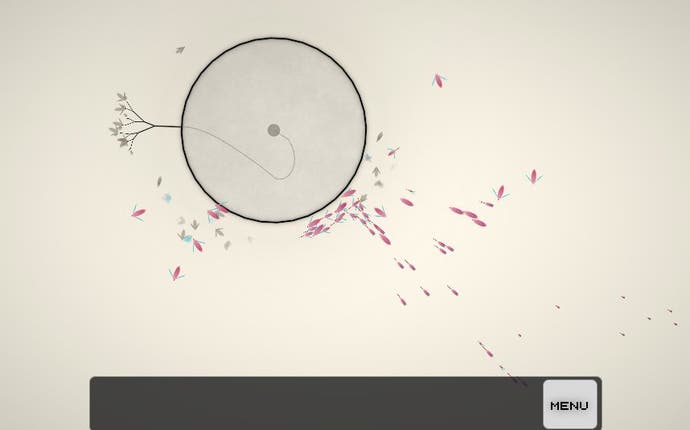Independent Games Festival Finalists Roundup
The spirits of independence.
Then we have Dyson. This is my personal favourite, because I'm both a big strategy geek, and a lover of weird, procedural cleverness in game design. It's a fairly classic RTS in some ways: you build your units, then send them off to exploit resources on the rest of the map. That's about where the similarity ends, however, because your resources are flying seedling things that are half-plant, half-fly, and they are colonising a series of spherical "asteroids", which are spread out across a beige space. Once seedlings penetrate the heart of these and take root, they are able to grow into trees and generate more of your primary unit type - more seedlings. Planting tree types allows you to set up both resource-management, and defence.
As you spread across the abstract constellation you find yourself encountering enemy trees, and seedlings, and they must be destroyed, usually by sheer force of numbers. As the game escalates, so the numbers involved reach astronomical proportions. Timing and tactics soon come into play, and Dyson proves itself to be a very strange, but very beautiful and intriguing, work of strategy gaming. There's something enormously compelling about the huge swarms of seeds you send out to attack an enemy asteroid, and it seems tied into a theme that runs through this year's IGF: one of ambient visuals combined with very traditional game mechanisms to create entirely fresh experiences.
Fourth in our round up is Night Game. This is an astonishingly playable title from Nicklas "Nicalis" Nygren, who is also working on the WiiWare version of Japanese side-scolling action-adventure, Cave Story. Night Game is all visualised in silhouette, with the action taking place in the shadowy foreground, and the background providing the only colours - sombre night-time blues and purples. It's an action puzzle game where you must use the weird physics of a travelling ball to progress. While it moves realistically most of the time, it has a kind of anti-gravity "stickiness" to it, allowing you to pull off feats of inertia to find your way through the game. It's oddly reminiscent of old-school action-adventure Another World, with each single screen posing you with a particular puzzle. I don't expect this to win, but it will doubtless conjure up a cult following on its release later this year.

Finally, we have the wonderful Osmos. This is a beautiful, organic idea for a game. You are a bubble of (possibly biological) matter on a floaty 2D plane. As such you can absorb blobs that are smaller than you, and increase your size. Bigger blobs will absorb you, and must be avoided. There's a fascinating trade-off, however: to propel yourself you must expel matter, meaning that the faster and harder you move in your viscous, ambient fluid surroundings, the smaller you get. Managing the amount of material you expel becomes absolutely crucial to surviving the tougher levels, because an ejection too far might mean you can't engulf your target, and will lead to your doom.
Osmos is possibly the most classically game-like of the five finalists in its design, but the way in which this is implemented - with pulsing visuals and a soothing ambient soundtrack - makes it the most strange and relaxing. It's probably the most chilled-out game you will play this year, and it would be ideal for falling asleep to, were it not so utterly engrossing.
So let's come back to where we started and stress that this is one of the most intriguing set of finalists in several years. Perhaps the indie gaming scene has been over-hyped in the past few months, and I'm certainly one of those writers responsible for talking up the talents of the independent few. But after 2008 I felt pretty well validated by our faith in the scene. Somehow I can't see any of the 2009 Grand Prize games having quite the impact of last year's finalists, but they're nevertheless enormously intelligent, creative game design projects that give me hope for the ongoing creativity of this basement-level of gaming. Look wider at the awards as a whole and we see PixelJunk Eden, Cortex Command, Zeno Clash and Machinarium - all startling, esoteric works of independent design. Indie gaming is here to stay.
